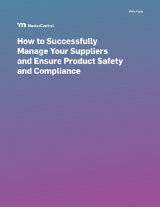
GxP Lifeline
Supplier Quality Agreements 101: What, Who, and Why?

Medical device manufacturers are ultimately responsible for the products they make and sell, even if they outsource some or all of their manufacturing or other operations. To ensure that products are safe and meet the claims made for them, the U.S. Food and Drug Administration (FDA) and other regulatory bodies are looking to the companies that sell the product to have sufficient control over their suppliers.
Quality agreements with suppliers can go a long way to demonstrating the kinds of control that medical device manufacturers have over their suppliers.
What Is a Supplier Quality Agreement?
A good supplier quality agreement takes the guesswork out of the process of deciding who – the manufacturer or the supplier – is responsible for what and how communication should work between the two. It specifies what is expected of both parties and spells out the roles for each type of activity or document.
Supplier quality agreements may vary from company to company, but all generally include:
- Scope and period of agreement.
- Definitions of terms in the agreement.
- Detailed specifications for the devices/activities covered.
- Agreement that the supplier will not make changes to the product, processes, or quality agreement without the manufacturer’s written permission.
- Explanation of how notification of desired changes is communicated.
- Plan for handling of corrective action/preventive action (CAPA) investigations.
- Allowed visits and/or audits of the supplier by the manufacturer or regulatory body.
- Record/documentation retention requirements.
- Whether there is a requirement that the supplier maintain a certified quality system or other certification, and if there is, agreement that the supplier notifies the manufacturer if there is a status change to that certification.
Note that quality agreements are not supply agreements. The FDA recommends that the quality agreement be a separate document from the supply agreement, though it may be included by reference in the main supplier agreement.
Which Suppliers Should Have a Supplier Quality Agreement?
Critical and key suppliers should have quality agreements, as should outsourced processes related to the manufacture of your product:
- Critical suppliers – Those that deliver materials, components, or services that may influence the safety and performance of a device.
- Key suppliers – Those that are the single source of a key component or material, those with long lead times, or those that don’t have a certified quality management system.
- Contract manufacturers – Those that are acting on behalf of the manufacturer and are doing a variety of operations that the manufacturer does not control directly.
- Distributors – Those that interface directly with the customer and the extent of their responsibilities can have both quality and regulatory ramifications.
Outsourced processes are a part of the manufacturing process that the manufacturer doesn’t control directly. Quality agreements are one working tool, in addition to process validation, that can be used to maintain control over outsourced processes.
Why Is a Supplier Quality Agreement Necessary?
While the FDA doesn’t require medical device manufacturers to have a quality agreement, FDA 21 CFR 820.50 requires that companies control all their suppliers, including providers of materials, services, consultants, and contractors, if they could have an effect on product quality or the quality system. ISO 13485 section 7.4.1 includes purchasing control requirements that would be best achieved with the use of a quality agreement as a tool.
Although it is in a supplier’s best interest to maintain a high standard of quality, the regulatory burden ultimately rests on the company receiving the supplier’s product or service. Quality agreements can play a crucial role in helping companies demonstrate to regulatory agencies that they are properly controlling their suppliers.
Quality Agreements Benefit Manufacturers and Suppliers
Quality agreements are an essential part of the relationship between a manufacturer and its suppliers and contractors. These documents help both the manufacturer and the supplier understand their roles, responsibilities, and expectations. In addition to demonstrating proper control of contract manufacturers and critical and key suppliers, quality agreements can also provide clarity, foster good communication, and facilitate smoother operations for both the manufacturer and the supplier.
Resources:
- "21 CFR 820.50 - Purchasing Controls," U.S. Food and Drug Administration, Nov. 10, 2020 (last updated).
- "ISO 13485:2016, Section 7.4 - Purchasing," International Organization for Standardization, 2016.
- "Contract Manufacturing Arrangements for Drugs: Quality Agreements Guidance for Industry," U.S. Food and Drug Administration, May 7, 2020 (current as of).
- "Supplier Quality Agreements: Benefits to You and Your Supplier," Betty Lane, GxP Lifeline, May 10, 2012.
Free Resource

Enjoying this blog? Learn More.
How to Successfully Manage Your Suppliers and Ensure Product Safety and Compliance
Download Now